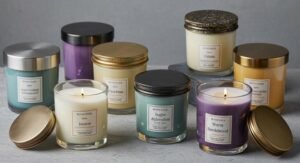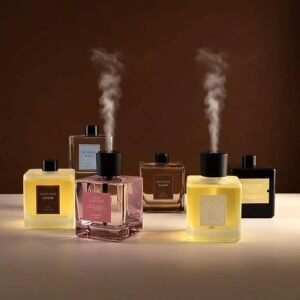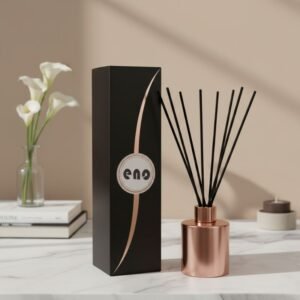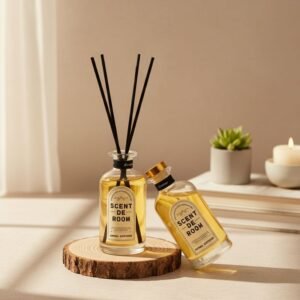Brands struggle with generic fragrances that fail to distinguish them in saturated markets, leaving customers unable to form memorable scent associations.
Custom fragrance manufacturers create distinctive olfactory signatures that enhance brand recognition and customer loyalty through personalized scent development, offering strategic differentiation in competitive markets.
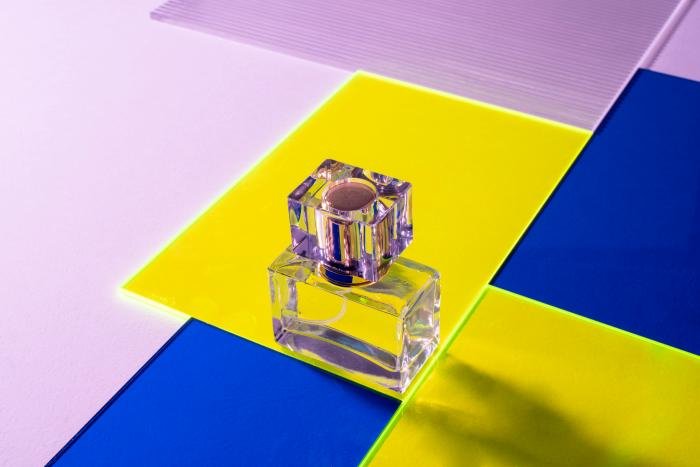
Partnering with specialized manufacturers transforms fragrance from commodity to competitive advantage through tailored scent customization.
What Makes Custom Fragrance Manufacturing Essential for Brand Identity?
Generic scents blend brands into mediocrity. Your competitors use identical fragrances while customers forget which brand they encountered. Custom fragrance manufacturing creates distinctive olfactory signatures that transform brand recognition.
Custom fragrance manufacturing establishes unique scent recognition that differentiates brands through emotional connections. A dedicated custom fragrance oil manufacturer creates proprietary formulations that strengthen brand identity and enhance customer recall through targeted olfactory branding strategies.

The Science Behind Scent Recognition and Memory
Research demonstrates that pleasant ambient scents improve brand evaluations by up to 40%, particularly for unfamiliar brands. The human olfactory system connects directly to the limbic brain, where emotions and memories form. This biological pathway explains why scent recognition creates lasting impressions that visual or auditory branding cannot match.
Custom fragrances trigger immediate emotional responses. Brands using distinctive scents achieve 65% higher customer recall rates than those relying solely on visual elements. The correlation between scent and emotional branding stems from evolutionary memory patterns that link specific aromas to safety, comfort, or excitement.
Strategic Advantages of Proprietary Fragrance Development
| Development Phase | Timeframe | IP Considerations | Business Impact |
|---|---|---|---|
| Concept Creation | 2-4 weeks | Non-disclosure agreements | Unique positioning |
| Formulation R&D | 3-6 months | Patent applications | Competitive advantage |
| Sample Approvals | 1-2 months | Trademark protection | Market differentiation |
| Production Scale | 2-3 months | Trade secret protocols | Revenue protection |
Working with an experienced custom fragrance oil manufacturer like Loveeno ensures comprehensive IP protection throughout development. Their R&D capabilities span from initial concept to final production, maintaining formulation confidentiality while delivering complexity levels that mass-market fragrances cannot replicate.
Custom manufacturing enables brands to control every aspect of their olfactory identity. Unlike licensing existing fragrances, proprietary development creates exclusive ownership rights that competitors cannot duplicate or reverse-engineer.
How Does the Custom Fragrance Development Process Unfold?
Brands seeking custom fragrances often struggle with complex development timelines. The process involves multiple stakeholders, unclear IP ownership, and lengthy R&D phases. Expert guidance transforms these challenges into strategic opportunities.
Custom fragrance development unfolds through four critical phases: scent briefing, formulation development, rigorous testing protocols, and production scaling. Each stage requires specialized expertise and careful IP management to ensure successful market launch.

Initial Scent Briefing and Concept Development
The fragrance development process begins with intensive scent briefing sessions between brands and perfumers. During this phase, teams establish olfactory direction, target demographics, and brand positioning requirements. Professional briefings include reference samples, competitor analysis, and detailed technical specifications.
Successful briefings require non-disclosure agreements protecting both brand concepts and formulation secrets. Established perfume houses like Loveeno structure these sessions to capture nuanced brand requirements while maintaining IP confidentiality throughout development phases.
Formulation Phases and Testing Protocols
Fragrance formulation involves iterative development cycles spanning 12-18 weeks for complex compositions. Master perfumers create initial accords, then refine through systematic testing phases. Each formulation iteration undergoes stability testing, longevity assessments, and skin compatibility evaluations.
| Development Phase | Timeline | Key Activities | IP Considerations |
|---|---|---|---|
| Initial Formulation | 2-4 weeks | Accord creation, base structure | Formula ownership agreements |
| Refinement Testing | 6-8 weeks | Stability trials, wear testing | Modification rights documentation |
| Final Approval | 2-4 weeks | Sample validation, production specs | Exclusive licensing terms |
| Production Scaling | 4-6 weeks | Batch consistency, quality control | Manufacturing IP protection |
Production scaling requires careful attention to batch consistency and quality control protocols. Manufacturers must maintain formulation integrity while achieving commercial production volumes, ensuring the final product matches approved samples exactly.
What Legal Considerations Shape Your Custom Fragrance Partnership?
Custom fragrance partnerships expose brands to complex IP ownership disputes, regulatory compliance risks, and formula protection challenges that can derail projects.
Strong fragrance exclusivity agreements, comprehensive licensing agreements, clear scent ownership terms, robust regulatory compliance protocols, and protected intellectual property frameworks form the foundation of successful custom fragrance partnerships.
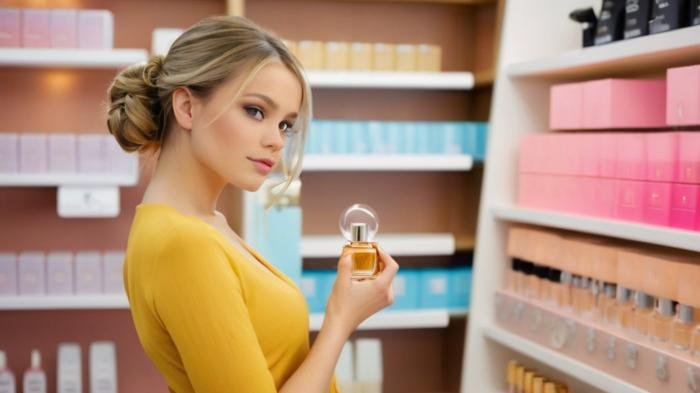
Intellectual Property Protection and Ownership Rights
Fragrance formulas exist in a unique IP landscape where traditional patent protection rarely applies. Instead, scent ownership relies heavily on trade secrets and confidentiality agreements. Non-disclosure agreements become crucial protective mechanisms, safeguarding proprietary formulations throughout the development process.
The ownership structure typically depends on partnership terms. Some agreements grant the brand full formula ownership, while others maintain shared rights or allow the perfumer to retain certain formula elements. Clear documentation of IP ownership prevents future disputes and ensures both parties understand their rights to modify, reproduce, or license the fragrance.
| Legal Protection Type | Fragrance Application | Duration | Key Benefits |
|---|---|---|---|
| Trade Secrets | Formula composition | Indefinite | Complete confidentiality |
| Trademarks | Brand names/packaging | 10-year renewable | Market exclusivity |
| Copyright | Marketing materials | Creator’s lifetime + 70 years | Creative protection |
| NDAs | Development process | Contract-specified | Partnership security |
Regulatory Compliance and Licensing Framework
Regulatory compliance spans multiple jurisdictions and safety standards. FAFAI guidelines, EU regulations, and FDA requirements each impose specific documentation, testing, and labeling obligations. Licensing agreements must address these compliance responsibilities, clearly defining which party handles regulatory submissions and ongoing monitoring.
International market expansion requires additional legal considerations. Each region maintains distinct fragrance regulations, ingredient restrictions, and labeling requirements. Smart licensing agreements anticipate these complexities, establishing compliance frameworks that support global distribution while maintaining legal protection across all markets.
Loveeno’s expertise in navigating these regulatory landscapes helps brands structure partnerships that protect IP while ensuring full compliance across target markets.
How Do Quality Control Standards Affect Custom Fragrance Production?
Inconsistent fragrance quality destroys brand reputation and customer loyalty faster than any marketing campaign can rebuild it.
Quality control standards directly impact custom fragrance production through rigorous raw material sourcing, stability testing protocols, scent consistency verification, and comprehensive fragrance documentation that ensures reproducible formulations and regulatory compliance.

Raw Material Sourcing and Documentation Requirements
Quality control begins with stringent raw material sourcing protocols. Each ingredient requires certificates of analysis, purity verification, and batch tracking documentation. Suppliers must provide detailed specifications including origin, extraction methods, and chemical composition data. This documentation becomes critical for regulatory submissions and formula reproduction.
At Loveeno, our supplier qualification process involves comprehensive audits and continuous monitoring to maintain ingredient consistency across production batches. We maintain detailed records of every raw material lot, ensuring complete traceability from source to finished product.
Stability Testing and Scent Consistency Protocols
Stability testing protocols evaluate fragrance performance under various environmental conditions including temperature fluctuations, humidity exposure, and UV light degradation. These tests predict product shelf life and maintain scent consistency throughout the product lifecycle.
| Testing Parameter | Duration | Acceptance Criteria |
|---|---|---|
| Accelerated aging | 3-6 months | <5% scent deviation |
| UV resistance | 72 hours | Minimal color change |
| Temperature cycling | 30 days | Stable formulation |
| Microbial testing | Throughout shelf life | Zero contamination |
Custom fragrance production requires additional consistency checks beyond standard protocols. Each batch undergoes sensory evaluation by trained perfumers who verify scent profile accuracy against the master formula. Gas chromatography analysis confirms chemical composition matches specifications, while headspace analysis ensures volatile compound ratios remain consistent. This multi-layered approach guarantees that custom fragrances maintain their intended character across production runs.
Why Should Brands Consider Long-term Partnerships With Fragrance Manufacturers?
Short-term fragrance relationships create supply risks and limit innovation. Brands face unpredictable pricing, inconsistent quality, and restricted access to exclusive formulations.
Long-term fragrance partnerships provide supply chain security, continuous scent evolution, enhanced market responsiveness, and exclusive access to advanced R&D capabilities that drive sustainable competitive advantages.
%[Long-term fragrance partnership collaboration in modern laboratory](https://placehold.co/600×400 "Long-term fragrance manufacturer relationship benefits")
Strategic Supply Chain Security and Consistency
Long-term fragrance partnerships establish predictable supply chains that protect brands from market volatility. Committed manufacturers prioritize partner brands during raw material shortages and maintain consistent pricing structures. This relationship model enables fragrance manufacturer partnerships to develop proprietary ingredient sourcing networks and backup production facilities.
Market responsiveness improves significantly through established communication channels and streamlined approval processes. Partners understand brand DNA and can rapidly adapt formulations to emerging consumer preferences without compromising signature scent profiles.
| Partnership Duration | Supply Chain Benefits | Innovation Access | Cost Savings |
|---|---|---|---|
| 1-2 years | Basic reliability | Limited custom options | 5-10% |
| 3-5 years | Priority allocation | Moderate R&D access | 15-20% |
| 5+ years | Exclusive capacity | Full innovation pipeline | 25-35% |
Continuous Scent Evolution and Innovation Access
Extended partnerships unlock continuous scent evolution through dedicated R&D resources and shared innovation investments. Manufacturers allocate specialized teams to partner brands, creating proprietary formulation libraries and exclusive ingredient combinations unavailable to competitors.
These collaborations accelerate time-to-market for seasonal variations and line extensions. Partners like Loveeno develop deep understanding of brand requirements, enabling faster sample approvals and reduced development cycles while maintaining stringent non-disclosure agreements that protect intellectual property throughout the innovation process.
Conclusion
Custom fragrance manufacturers transform generic brand experiences into distinctive olfactory identities that drive customer loyalty and market differentiation. Through strategic partnerships with specialized perfumers, brands secure exclusive scent customization capabilities that create lasting emotional connections and competitive advantages. The comprehensive development process—from initial briefing through production scaling—ensures bespoke fragrance solutions that reflect unique brand DNA while maintaining regulatory compliance and intellectual property protection. Long-term collaborations with experienced manufacturers like Loveeno provide supply chain security, continuous innovation access, and evolving scent profiles that adapt to changing market demands. Partner with a custom fragrance manufacturer today to unlock your brand's distinctive olfactory potential.
FAQ
Q1: What are the key phases in custom fragrance formulation?
Custom fragrance formulation involves several phases: initial consultation to define scent preferences, R&D for creating prototypes, sample testing and approvals, final adjustments, and production. Each phase ensures the scent aligns with the brand's vision and meets regulatory standards.
Q2: How do licensing agreements work with custom fragrance manufacturers?
Licensing agreements in custom fragrance manufacturing outline the terms for scent usage, exclusivity, and intellectual property rights. These agreements ensure the brand retains control over the fragrance while the manufacturer adheres to production and confidentiality clauses.
Q3: What is the typical R&D timeframe for a custom fragrance?
The R&D timeframe for a custom fragrance varies but generally takes 6-12 weeks. This includes initial scent development, multiple rounds of sample testing, and refinements to achieve the desired olfactory profile.
Q4: Why are non-disclosure agreements important in custom scent creation?
Non-disclosure agreements (NDAs) protect a brand's proprietary scent formulations and business strategies. They ensure confidentiality during the development process, preventing unauthorized use or disclosure of sensitive information.
Q5: Can a custom fragrance manufacturer guarantee exclusivity for a scent?
Yes, many custom fragrance manufacturers offer exclusivity agreements, ensuring the scent is unique to your brand. This is often negotiated during the initial contract phase and may involve additional costs.

